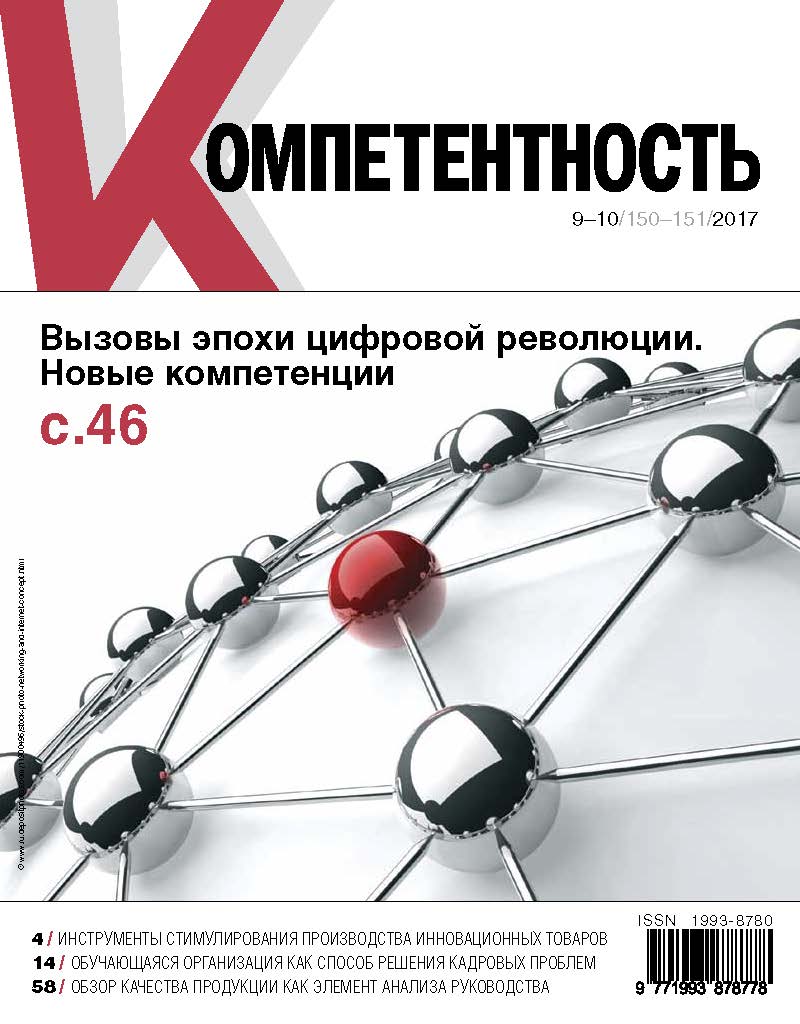Journal Kompetentnost': 9-10 / 150-151 / 2017
Articles
-
1
Digital Economy. Tools to Stimulate the Production of Innovative Products
Authors: Dr. Е.А. Rovnykh, Director, IT Department, JSC Far East Development Corporation, DBA, Moscow, Russia, rovnykh_ea@mail.ru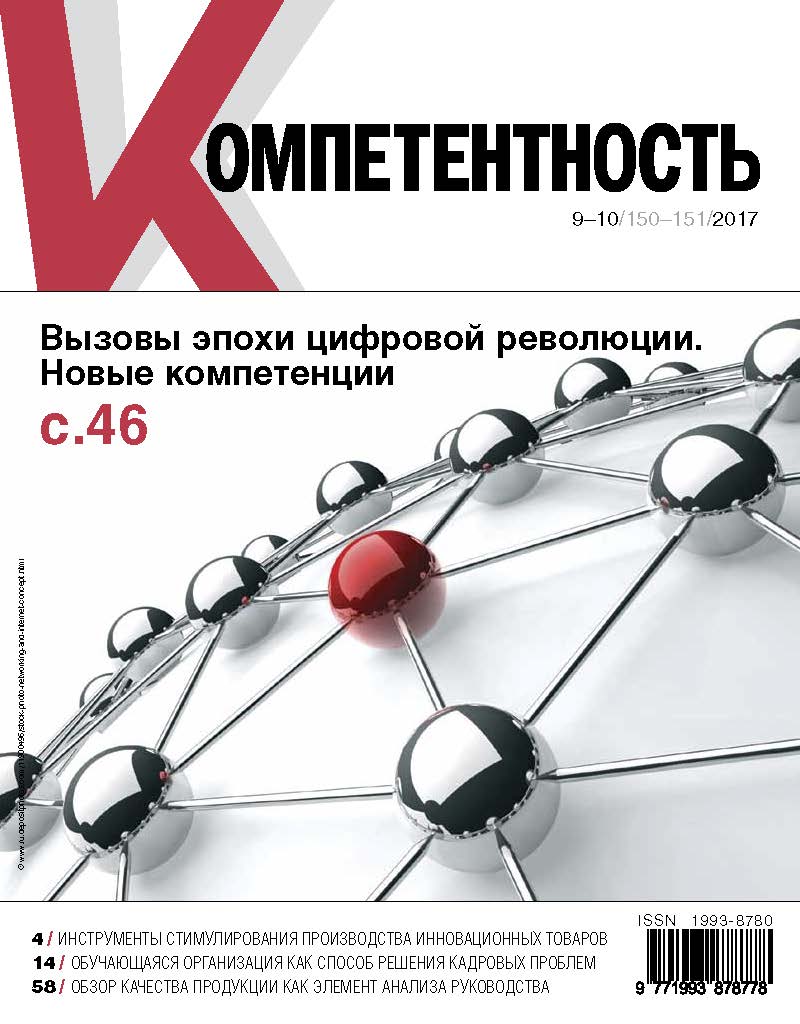 The importance of innovation is recognized at all levels of government. Formation
The importance of innovation is recognized at all levels of government. Formation
of infrastructure that ensures the development of innovative goods, works and services
is the most important task of the RF government and all institutions of innovation
development. Unfortunately, Russia is far behind leading countries in terms
of production volume and innovative products consumption. Software development
is one of the most dynamic and promising segments of innovative products. In the study,
I have reviewed and described the main tools to stimulate the production of innovative
products in the digital economy. The creation and development of virtual territories
for social and economic development will provide support and further growth
of innovation activity in Russia in the context of Industry 4.0 and the implementation
of the state program Digital Economy of the Russian Federation.
I believe that formation of virtual territory for socio-economic development
of innovative software will make it possible to reduce the software production
(development) cost, to increase the transferring results speed from their development
sphere to the sphere of practical use, and to stimulate its implementation.
Download -
2
Learning Organization as a Way of Solving Personnel Problems
Authors: Dr. Е.Yu. Sergeeva, Researcher, FSBEI HPE Kemerovo State University (Belovo Branch), Belovo, Russia, sergeevaeu3@gmail.com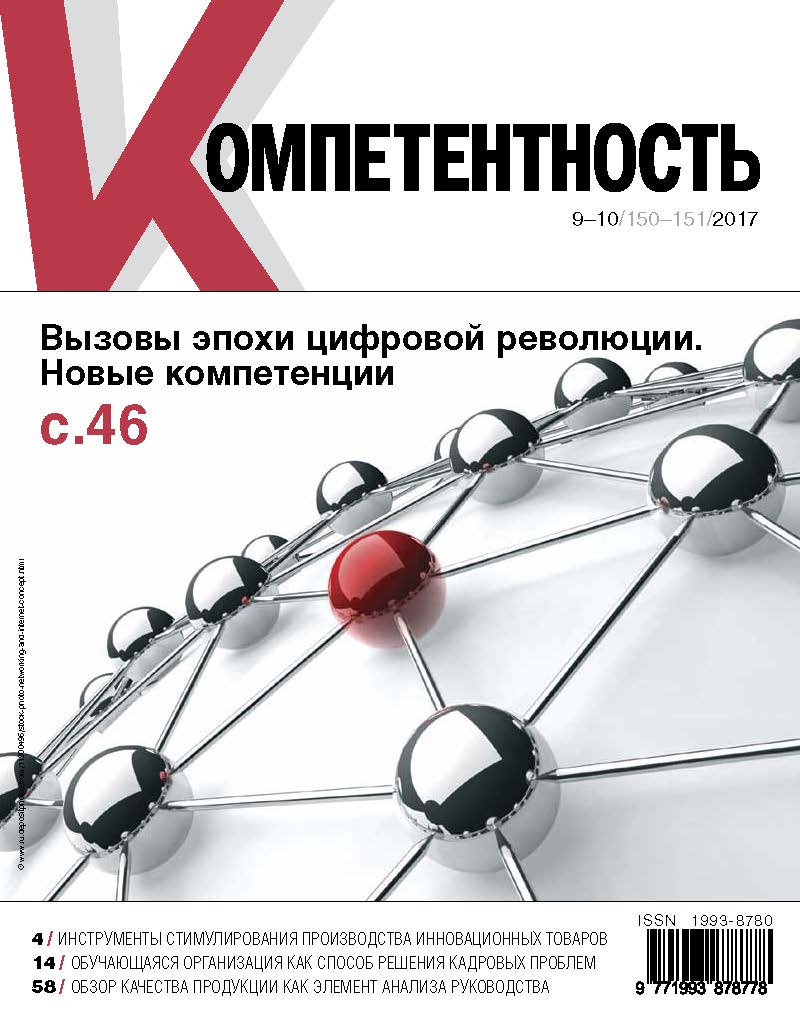 Today, the way of adapting a business to an unstable environment is investing in human
Today, the way of adapting a business to an unstable environment is investing in human
capital — creating a learning organization through a learning system, transferring,
sharing knowledge, accumulating human capital within the company. The creation of
learning organization is necessary to constantly update the professional knowledge
and skills of employees. The corporate training system contributes to the improvement
of labor efficiency and, in general, the company’s competitiveness. However, it is
impossible to build a learning organization without a comprehensive, systemic approach
that can debug the mechanism of the enterprise’s functioning and increase its adaptive
capacity for the external environment. In this article, I have investigated the need to
create a learning organization in an environment of unstable external environment,
as well as the negative impact of unskilled personnel on building a learning company,
proposed an algorithm for necessary organizational changes in the company.
Download -
3
Methodology for Forming a Program of Developing the Basic Military Technologies in Conditions of Limited Resources
Authors: Dr. S.Е. Pankov, Senior Researcher, Head of Department, Office of Advanced Interspecific Researches and Special Projects, Ministry of Defense of the Russian Federation, Moscow, RussiaDr. S.S. Smirnov, Associate Professor, Deputy Head, Department of the Federal State Budgetary Institution 46th Central Research Institute, Ministry of Defense of the Russian Federation, Moscow, Russia, sss-smirnov@mail.ruDr. S.V. Stukalin, Head of Laboratory, Department of the Federal State Budgetary Institution 46th Central Research Institute, Ministry of Defense of the Russian Federation, Moscow, Russia, svstukalin@gmail.comDr. D.G. Khovanov, Senior Researcher, Department of the Federal State Budgetary Institution 46th Central Research Institute, Ministry of Defense of the Russian Federation, Moscow, Russia, d.khovanov@gmail.com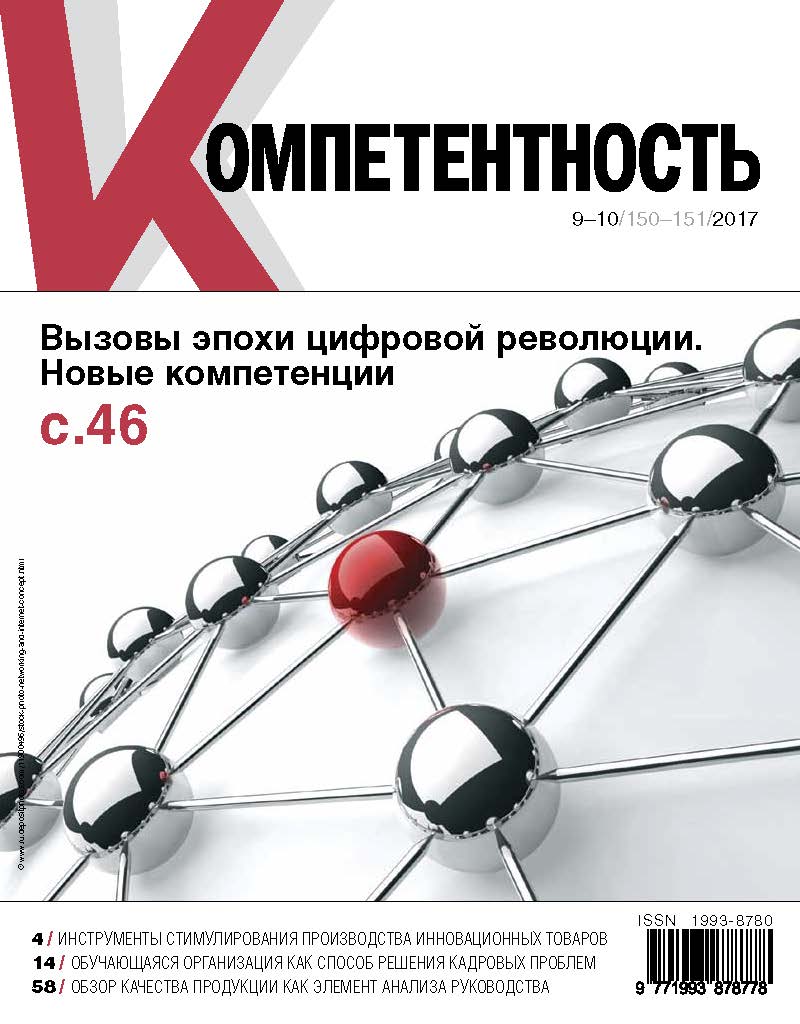 The purpose of the article is to disclose the main approaches used to form the program
The purpose of the article is to disclose the main approaches used to form the program
for developing basic military technologies, as well as to develop proposals for their
improvement in conditions of resource constraints. We have consistently examined the
issues related to the problem under study, namely: the analysis of existing approaches
to form a program for developing basic military technologies; proposals for improving
the methodological support for this program formation; method of program forming
in limited resources conditions. The presented methodology for forming a program
for developing basic military technologies makes it possible to justify the rational
composition of program activities, taking into account financial constraints on the
creation of a scientific and technical reserve for advanced models of weapons, military
and special equipment, which significantly distinguishes it from existing approaches.
Download -
4
Personnel Training and Certification in the Field of Technical Regulation
Authors: Dr. L.A. Bondar’, Chairman, Committee of the Chamber of Commerce and Industry of the Russian Federation on technical regulation, standardization and quality of products,, Moscow, Russia, L.Bondar@hse.ruDr. S.V. Pugachev, Deputy Executive Director, National Association of Builders, Moscow, Russia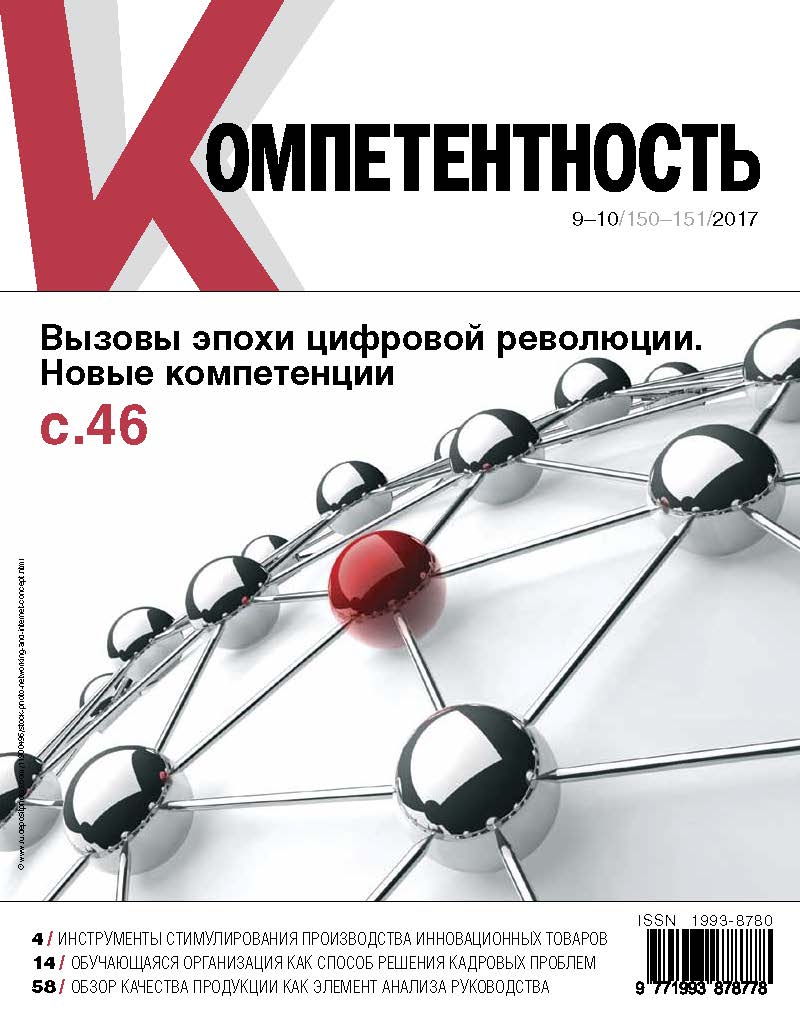 Providing market participants with competent personnel in the field of technical regulation is one of the priority areas of counteracting the trafficking in falsified and counterfeit products. Additional vocational education, capable to react effectively to new demands of the economy, plays a decisive role in the training and professional development of personnel in the field of technical regulation and quality management. In this article I have reviewed the personnel assessment system (indicators and methods) in the field of technical regulation, which involves such methods of personnel assessment as standardization of personnel requirements, training, evaluation of professional qualifications and certification of audit experts of conformity assessment bodies, and recommendations on the implementation of mechanisms for training, evaluation and certification of personnel in the field of technical regulation are given.
Providing market participants with competent personnel in the field of technical regulation is one of the priority areas of counteracting the trafficking in falsified and counterfeit products. Additional vocational education, capable to react effectively to new demands of the economy, plays a decisive role in the training and professional development of personnel in the field of technical regulation and quality management. In this article I have reviewed the personnel assessment system (indicators and methods) in the field of technical regulation, which involves such methods of personnel assessment as standardization of personnel requirements, training, evaluation of professional qualifications and certification of audit experts of conformity assessment bodies, and recommendations on the implementation of mechanisms for training, evaluation and certification of personnel in the field of technical regulation are given.
Download -
5
Experts on Accreditation in the Field of Conformity Assessment and Ensuring the Uniformity of Measurements: the Requirements and the Procedure for Attestation
Authors: Dr. V.Е. Kovlyakova, Associate Professor, Department of Conformity Assessment, Academy of Standardization, Metrology and Certification (training), Advisor to the State Civil Service of the Russian Federation and Moscow, Technical Expert for Accreditation, Standardization Expert, Moscow, Russia, sdsniir@mail.ru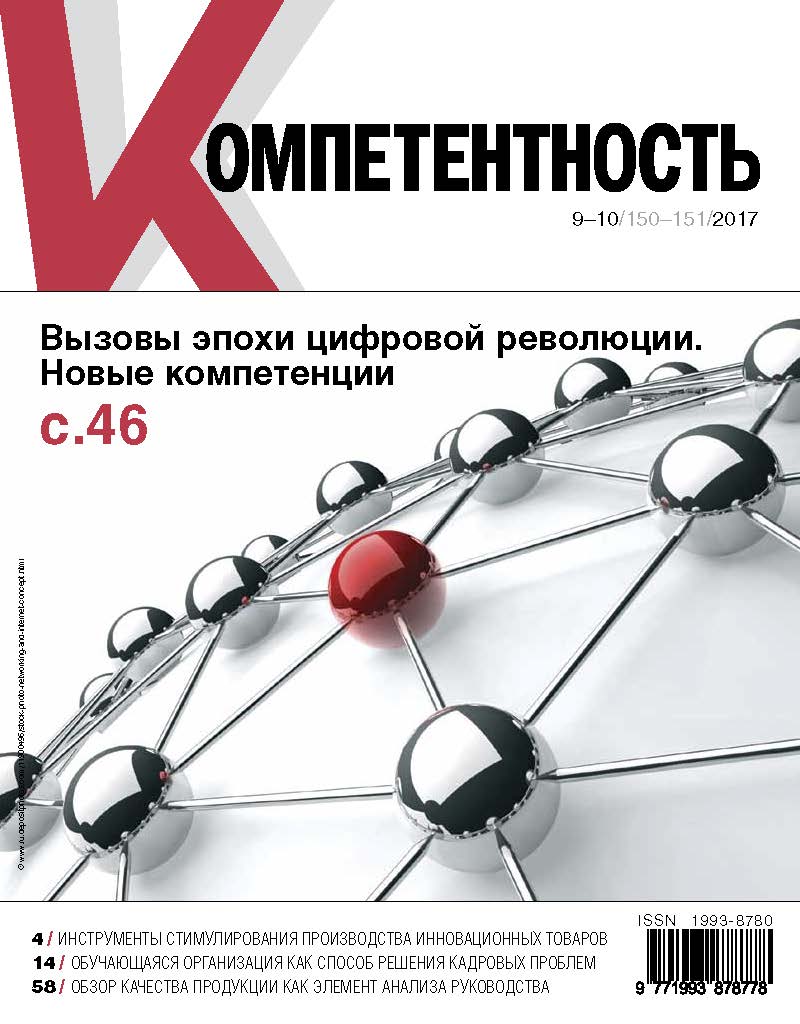 We have examined the current issues, concepts and requirements established by the
We have examined the current issues, concepts and requirements established by the
legislation in the field of accreditation, applied to the activity of accreditation experts
and technical experts, have analyzed the main aspects, the procedure for attestation, the
methodology for selecting experts for accreditation at the current stage, have presented
approaches to the education, training and competence of experts on accreditation in the
field of conformity assessment and ensuring the uniformity of measurements.
We consider that the status of accreditation experts should only be received by
competent and qualified specialists in a certain field of activity and attestation. Since
the activity of the national accreditation body as a whole depends on the quality of
their work, the requirements for these experts, under the federal law On Accreditation
and by-laws, are very high.
Download -
6
Challenges of the Digital Revolution Era. New Competences
Authors: Prof. Dr. V.N. Azarov, Professor, National Research University Higher School of Economics, Russian University of Transport (MIIT), Moscow, Russia, vazarov52@gmail.comProf. Dr. B.V. Boytsov, Professor, National Research University MAI, Moscow, Russia, kaf104@mai.ruDr. Yu.I. Gudkov, Associate Professor, National Research University Higher School of Economics, Moscow, Russia, ygudkov@hse.ruProf. Dr. V.P. Mayboroda, Professor, Russian University of Transport, Moscow, Russia, zn-e@yandex.ru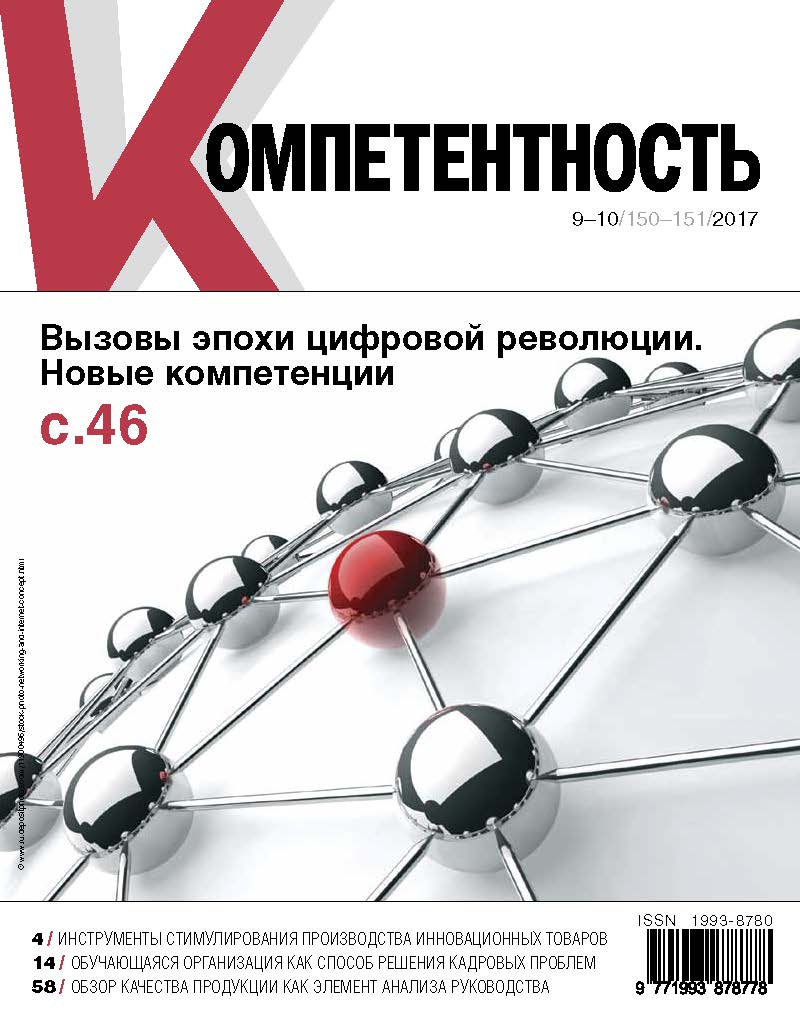 We have examined the main new competencies that should be matched by the
We have examined the main new competencies that should be matched by the
specialist — managers of complex techno-technological and socio-economic systems
in the era of information (digital) and industrial revolutions. We have also investigated
what kind of overprofessional competencies the expert should have and what the system
of its preparation includes.
Having outlined and analyzed modern approaches to the creation of integrated
systems of quality management and modern enterprise management, we have defined
new requirements that a manager in the digital revolution era must meet for the digital
economy, able to occupy a vacant niche in the labor market formed at the junction
of classical engineering, information and management specialties.
We are confident that today there is an urgent need to open new directions
for targeted training of such specialists.
Download -
7
Product Quality Review as an Element of Management Review
Authors: Dr. A.A. Spiridonova, Associate Professor, Moscow Technological University, Moscow, Russia, al.spiridonova@gmail.comDr. E.G. Khomutova, Professor, Moscow Technological University, Moscow, Russia, khomutova@mail.ru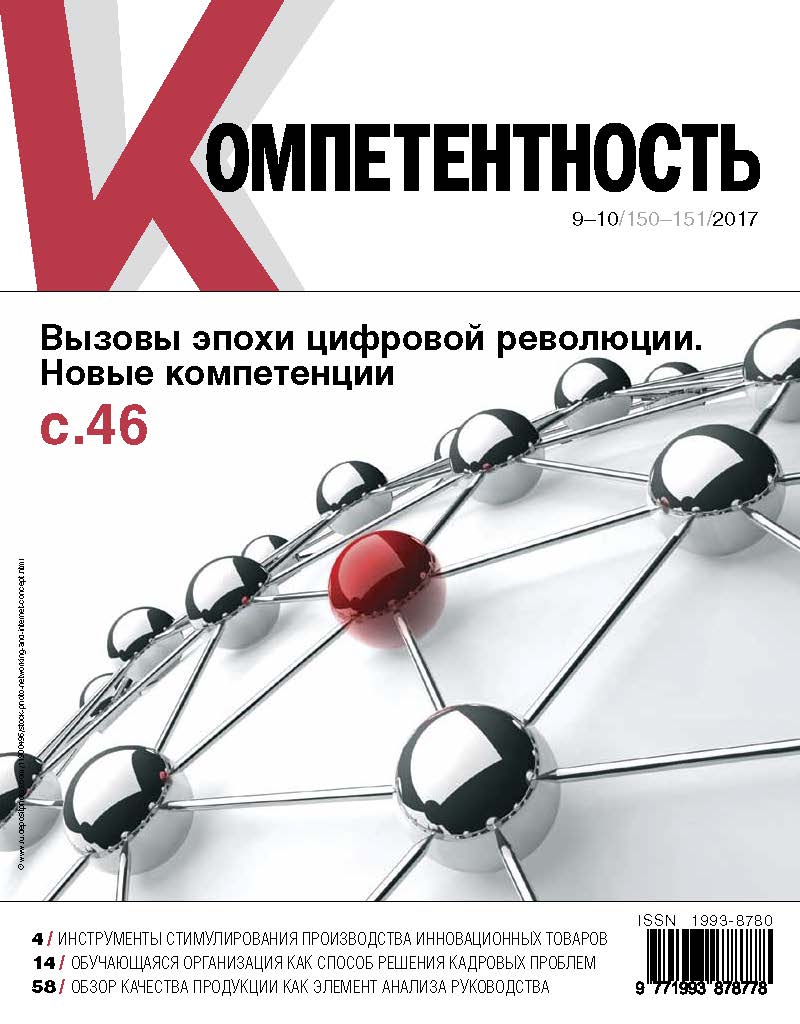 The value of the product quality review in the quality management system of
The value of the product quality review in the quality management system of
pharmaceutical enterprise is proved in this article. Special attention is paid to the
analysis of the document contents for carrying out management review in case of
development of the integrated quality management system based on GMP and
GOST R ISO 9001–2015. The possibility of product quality review development in
non-pharmaceutical industrial enterprises is emphasized and the positive sides of the
document application are considered. The product quality review content for the
manufacturing enterprises is considered in detail and the recommendations concerning
the description of each document section are step by step made. The challenges that the
organization can face in the development of product quality reviews are analyzed and
reasonable ways to overcome it are proved.
Download -
8
On Formation and Development of Productive Practical Knowledge
Authors: Dr. L.V. Sergienko, Management Department, Financial University at the Government of Russian Federation, Moscow, Russia, sergilub@yandex.ru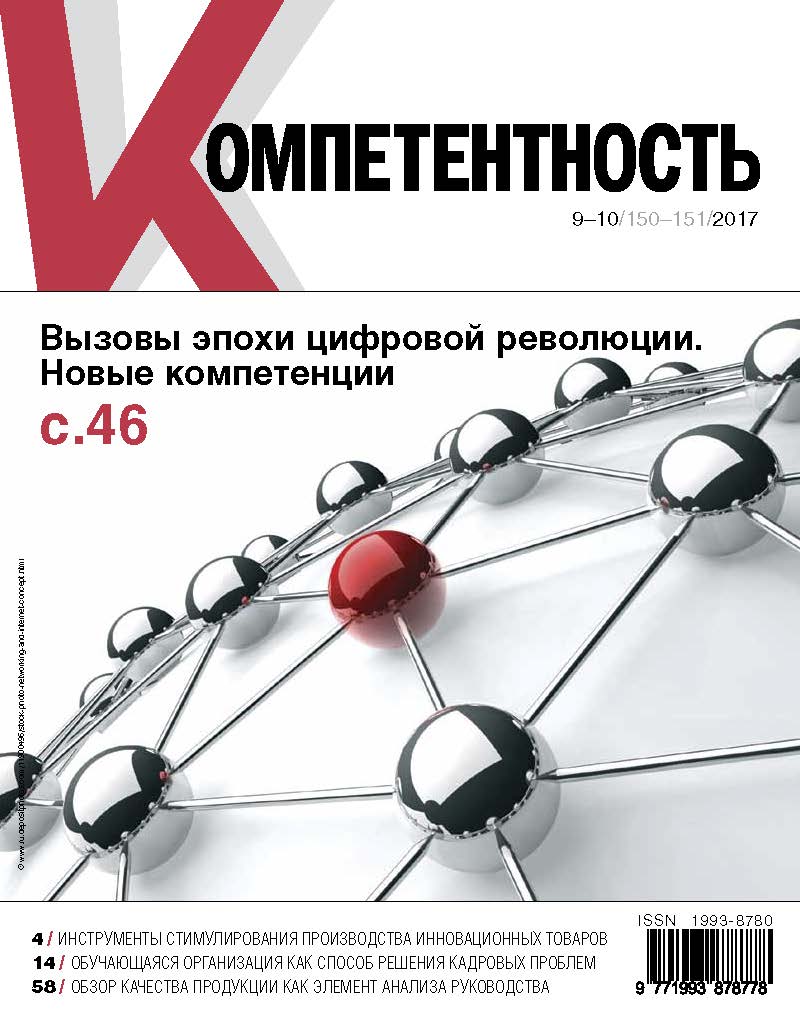 Usually, economics is defined as a science that studies social and economic relations
Usually, economics is defined as a science that studies social and economic relations
that arise in the sphere of production. However, these relationships are formed and
developed in the process of joint practical cognition, which is the basis of production
carried out by interacting subjects, which in turn belong to one or another social and
economic genotype formed and functioning within the given public organization and
aimed at satisfying specific needs. In this case, the presence of the genotypes themselves
is the result of acting the regularities inherent in human thinking and the behavior.
We have determined the specification of the economy subject as the purpose of this
work.
The specific content of each socially important need is of interest to us. This
determines and limits the process of management, which is the result of socio-economic
genotypic nature of man.
In this study, we have used two methods. These include analytical methods and
methods of comparative analysis of social processes under study.
We have obtained results that can serve as the basis for forecasting the direction
and dynamics of the socio-economic life of a particular economic community at a
particular stage of its functioning. We are sure that the foundations of the formation
and development of production are the result of acting the pattern inherent in human
thinking and behavior as such.
Download -
9
Metrological Support of Two-component Gas-liquid Mixture Consumption’s Measurement
Authors: Dr. V.N. Petrov, Leading Researcher, Research Department-9, Federal State Unitary Enterprise All-Russian Research Institute of Flow Metering, Kazan, Russia, petr_vl_n@mail.ruS.L. Malyshev, Researcher, Research Department-9, Federal State Unitary Enterprise All-Russian Research Institute of Flow Metering, Kazan, Russia, pamir.61@mail.ruS.V. Petrov, Director, Ltd BRiZ, Kazan, Russia, Petrov_1972@mail.ruL.A. Akhmetzhanova, Leading Engineer, Research Department-9, Federal State Unitary Enterprise All-Russian Research Institute of Flow Metering, Kazan, Russia, ot9vniir@yandex.ru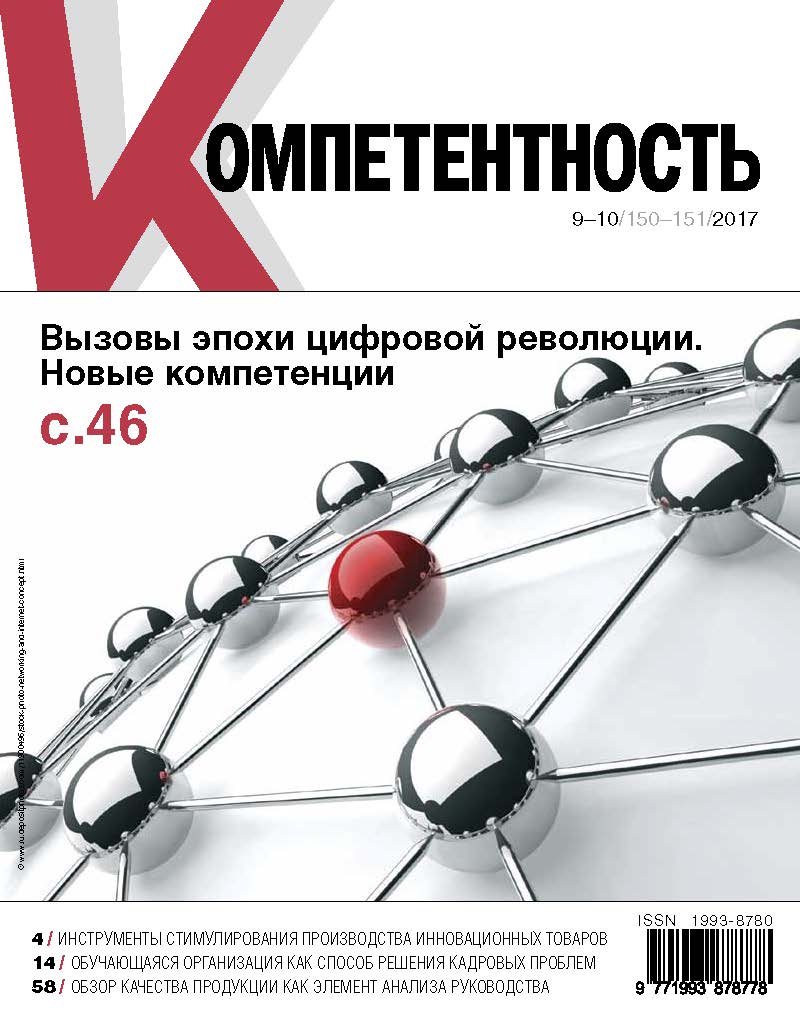 We have presented the materials of an experimental study of the estimating the error
We have presented the materials of an experimental study of the estimating the error
that arises when transporting oil from a licensed area to a processing plant. We have
also examined the structural diagrams of measuring systems that allow to determine
the flow rate of a two-component gas-liquid flow. The materials published in this
article can be very useful for both suppliers and consumers of oil, containing dissolved
and, subsequently, free gas, at conducting accounting operations between the supplier
and the consumer. We believe that they will be useful in the sphere of housing and
communal services, taking into account the amount of water supplied. We consider that
the consumer of one of the flowmeter devices described above will solve the problem of
measuring the flow rate of the liquid phase in a two-component gas-liquid flow.
Download -
10
Feasibility Study of Calibration Laboratory’s Complectation
Authors: М.V. Golobokov, Metrology Engineer, FBU The State Regional Center for Standardization, Metrology and Testing in the Novosibirsk Region, Novosibirsk, Russia, malachit_40@inbox.ruProf. Dr. S.B. Danilevich, Professor, Academy of Standardization, Metrology and Certification (Novosibirsk Branch), Novosibirsk, Russia, ser-danilevich@yandex.ruDr. N.G. Nizovkina, Associate Professor, Department of Economic Theory and Applied Economics, Novosibirsk State Technical University, Novosibirsk, Russia, nizovkina@ngs.ru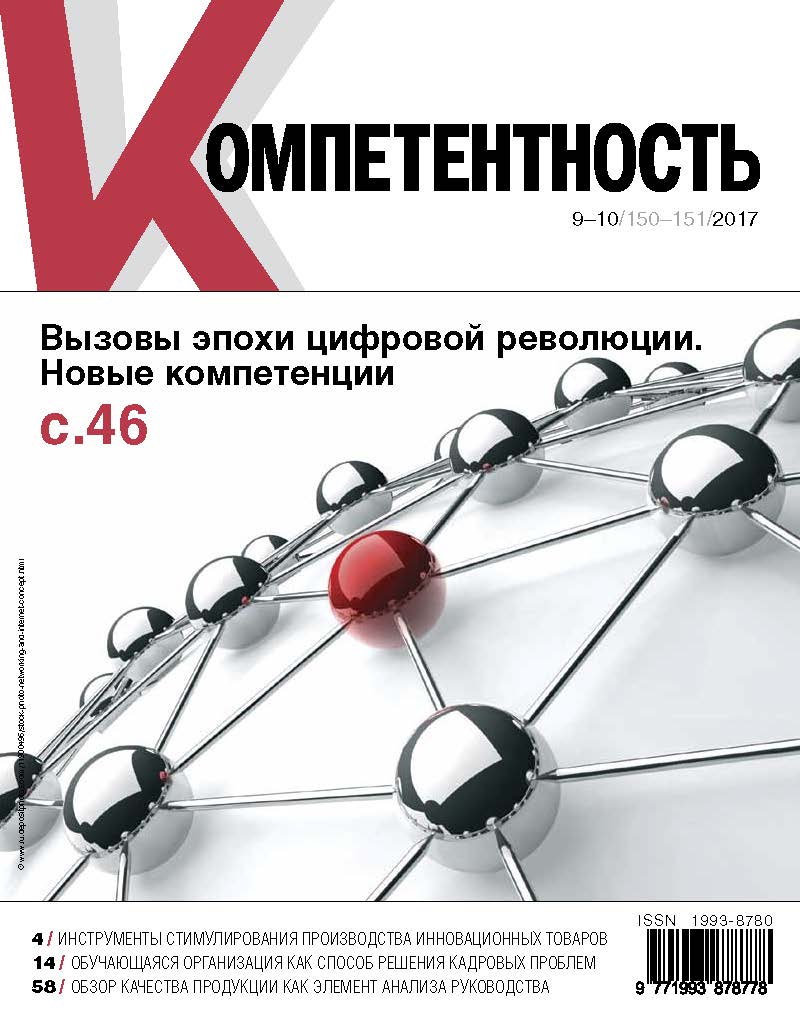 We have analyzed an alternative method of instruments calibration, which involves the
We have analyzed an alternative method of instruments calibration, which involves the
transfer of a magnitude unit from standards that implement the contact measurement
principle.
The study also has showed that the proposed alternative calibration procedure
allows:
(a) to reduce the number of calibration instrument points without loss of calibration
quality and save up to 40% of the calibrator’s time;
(b) to reduce capital investments by changing the set of equipment for calibration;
(c) to reduce annual operating costs by 12%;
(d) to receive an annual economic effect up to 185 thousand rubles (without taking
into account the savings of the calibrator’s working hours).
Thus, we have shown that the use of a liquid thermostat with a special insert as
a source of radiation reduces the cost of calibration.
In addition, using the proposed methodology, the laboratory for calibrating
pyrometers overcomes the profitability threshold when calibrating twice as few devices.
Download



